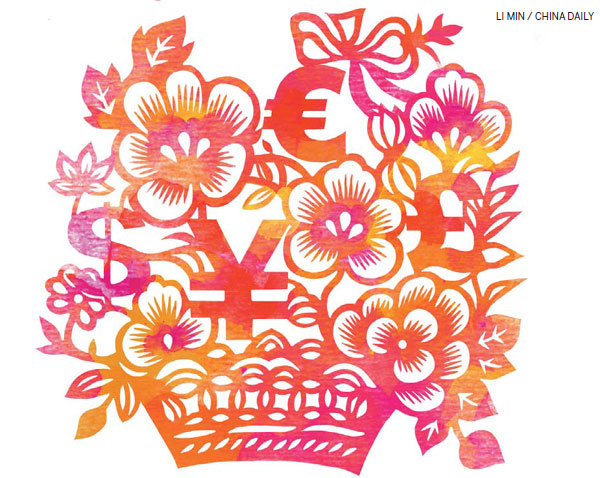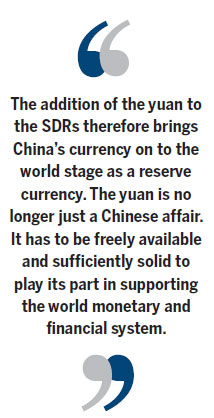Yuan inclusion speeds global integration
Updated: 2016-01-01 08:16
By Giles Chance(China Daily Europe)
|
|||||||||||
Adding renminbi to IMF basket of reserve currencies has ramifications beyond financial sector
The International Monetary Fund's announcement on Dec 1 that the yuan will make up nearly 11 percent of its special drawing rights from October 2016 has attracted widespread media coverage, much of which has been along the lines of: "The SDR is a historical relic and the yuan joining the SDR is no big deal."
But what is the reality?

In an age in which private capital is sent across the world at the touch of a button, it's tempting to describe the IMF's SDRs as a quirky, but unimportant, relic. At a time when in London alone, the foreign exchange market transacts $7 trillion every day, what, indeed, is the power of an institution like the IMF, which commands "only" $770 billion in capital reserves?
Boxers and wrestlers fight within a set of rules that are designed to prevent serious injury. In the world of international finance, traders and investors fight with each other for profit. It's generally considered that this never-ending struggle for profit benefits the public interest.

But who should set the rules for the money fights? The IMF stands above national financial treasuries and central banks to advise on, coordinate, guide and (to some limited extent) control their activities. As the world becomes more multilateral, and as cross-border financial flows become ever larger, the need for greater international financial and economic coordination and rule-making grows. The IMF's position is becoming more important as a multilateral institution that stands separate from its members, acting in the interest of all of them.
Because the IMF is independent, it has its own currency, the SDRs, which is made up of the most widely used and soundest currencies from among the 188 country members of the IMF. These are the dollar, the euro, the Japanese yen, the British pound and, from this year, the yuan. The IMF backs the SDRs with its own capital of about $670 billion, consisting of holdings of gold amounting to 90.5 million ounces, and the contributions (or quotas) it receives from its members, which are held in liquid securities. It uses the SDRs for transactions with its members, including providing loans to member countries, such as Greece, that need financial help while they are restructuring their economies.
The addition of the yuan to the SDRs therefore brings China's currency on to the world stage as a reserve currency. The yuan is no longer just a Chinese affair. It has to be freely available and sufficiently solid to play its part in supporting the world monetary and financial system. As Yi Gang, deputy governor of the People's Bank of China, observed the day after the IMF's SDR announcement, the yuan can be removed from the SDRs. China has therefore to show that it can play an important supporting role in the global financial system.
The Chinese, as a proud people conscious of their place in the world, will certainly appreciate the move and try to live up to their new responsibility. The impact of China's inclusion within the SDRs will be large, both within China and the rest of the world. Big changes are necessary in the largely closed and sometimes inefficient Chinese financial system to open it up more to global investors and traders and make it serve China's economic needs better. At present, China's banking system is dominated by four large state-owned banks. Non-Chinese financial institutions, including banks, insurance companies and brokerages, should be allowed to operate fully within China and compete with Chinese institutions. China's new global importance will encourage this to happen. Although competition would cut banking charges, it would also expand the market by providing better service. China's banks would benefit from that expansion, while many of their Chinese customers would be expected to remain loyal to Chinese institutions.

The yuan joining the SDRs would also stimulate reform in the non-financial parts of China's economy, particularly of state-owned enterprises, which continue to control many vital sectors like energy and telecommunications. These could be thrown open wider to competition, to benefit Chinese consumers, increase the efficiency and flexibility of China's economy, and make the state-owned participants stronger and more efficient. The government's role as an economic player in China would turn steadily toward regulating the economy and providing public goods, like transport, clean air and water, and education, and away from being a monopoly provider of goods and services like logistics, energy and banking.
Outside the country, Chinese membership of the SDRs will have a profound impact globally. This will not happen overnight, but is expected to be a powerful trend over the next few years. About a third of China's trade with other countries is already settled in yuan, making China's currency the most important in East Asia. This proportion will grow, underpinning the yuan's global role as a major trade settlement currency. China is now the largest buyer of commodities like iron ore and copper, and a major producer of some, and is also the largest energy user after the United States. Commodity and energy futures markets around the world will develop contracts denominated in yuan as well as dollars.
Another important development, which could occur in the next year or two, concerns the most widely followed equity global index - Morgan Stanley's Capital Index. The fact that the yuan will shortly become a reserve currency will affect MSCI's decision to raise China's equity allocation for global equity managers by around 10 percent from its current low level. This would promote the capital inflow of hundreds of billions of dollars of foreign portfolio investment into China.
Central banks will readjust their reserve allocations to hold yuan debt, a trend that will be followed by fixed income asset managers. This would increase demand for bonds denominated in yuan, for which supply would be created by yuan-denominated company and government borrowing in major capital markets around the world - New York, London and Tokyo. The so-called dim sum bond market - debt denominated in yuan that is sold and traded outside China - is expected to become very large. Foreign investors would seek to participate in China's own corporate and government bond markets. The sovereign issue of a 3-year maturity was priced at 3 percent, and was five times oversubscribed. This would promote much-needed reform in those markets.
The growth of Chinese import demand since 2000 has brought China's economic policy to global prominence. The new reserve currency status of the yuan and the development of yuan trading around the world, both for trade settlement and as investment in yuan-denominated financial securities, will highlight the importance of domestic Chinese monetary policy and interest-rate setting.
In hindsight, this will be seen as the year when China's next stage of global integration began.
The author is a visiting professor at Guanghua School of Management, Peking University. The views do not necessarily reflect those of China Daily.
(China Daily European Weekly 01/01/2016 page12)
Today's Top News
Storm Frank batters northern Britain
Over 1 million refugees fled to Europe by sea in 2015
Germany to spend 17b euros on refugees in 2016
Demand booms for high-end financial talent
Abe expresses apology for Korean victims of comfort women
North China encounters gas supply shortage
Asian Infrastructure Investment Bank launched
Russia says it has proof of Turkey's support for IS
Hot Topics
Lunar probe , China growth forecasts, Emission rules get tougher, China seen through 'colored lens', International board,
Editor's Picks

|

|

|

|

|

|






